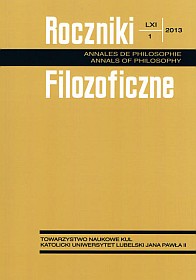What Is Logical Pluralism? (J.C. Beall’s and Greg Restall’s Standpoint)
Abstract
C. Beall and Greg Restall are advocates of a comprehensive pluralist approach to logic, which they call Logical Pluralism (LP). According to LP, there is not one correct logic, but many equally acceptable logical systems. The authors share Tarski’s conviction and follow the mainstream in thinking about logic as the discipline that investigates the notion of logical consequence. LP is the pluralism about logical consequence – a pluralist maintains that there is more than one relation of logical consequence. According to LP, classical, intuitionistic and relevant logics are not rivals, but they all are equally correct, they all count as genuine logics.
The purpose of this paper is to present some remarks concerning J.C. Beall’s and Greg Restall’s exposition of LP. At the beginning, the definition of the relation of logical consequence, which is central to their proposal, is shown. According to Beall and Restall, argument is valid if, and only if, in every case when the premisses are true, then the conclusion is, too. They argue that by considering different types of cases the logical pluralist obtains different logics.
The paper—apart from presenting LP—also gives a critical discussion of this approach. It seems, that the thesis of LP is far from being clear. It is even unclear what exactly LP is and where is stops. It is unclear what “equally good”, “equally correct”, “equally true” mean. It is not clear, how to explain, in scope of logic, that the system of logic, is a model of real logical connections.
References
Allo P.: Logical Pluralism and Semantic Information, „Journal of Philosophical Logic” 36 (2007), s. 659-694.
Beall J.C., Restall G.: Logical Pluralism, „Australasian Journal of Philosophy” 78 (2000), s. 475-493.
Beall J.C., Restall G.: Defending Logical Pluralism, [w:] J. Woods, B. Brown (red.), Logical Consequence: Rival Approaches Proceedings of the 1999 Conference of the Society of Exact Philosophy, Stanmore: Hermes 2001, s. 1-22.
Beall J.C., Restall G.: Logical Pluralism, Oxford 2006.
Borkowski L.: Wprowadzenie do logiki i teorii mnogości, Lublin 1991.
Brouwer L.E.J.: On the Foundation of Mathematics, [w:] tenże, Collected Works, t. I, ed. A. Heyting, Amsterdam–Oxford–New York 1975, s. 11-97.
Bueno O., Shalkowski S.: Modalism and Logical Pluralism, „Mind” 118 (2009), s. 295-321.
Burgess J.A.: [Rec.] J.C. Beall, G. Restall, Logical Pluralism, Oxford 2006, „Philosophy and Phenomenological Research” 81 (2010), s. 519-522.
Burgess J.A.: Which Modal Logic is the Right One?, „Notre Dame Journal of Formal Logic” 40 (1999), s. 81-93.
Ciprotti N., Moretti L.: Logical Pluralism is Compatible with Monism About Metaphysical Modality, „Australasian Journal of Philosophy” 87 (2009), s. 275-284.
Cook R.T.: Let a Thousand Flowers Bloom: A Tour of Logical Pluralism, „Philosophy Compass” 5 (2010), s. 492-504.
Etchemendy J.: The Concept of Logical Consequence, Cambridge 1990.
Goddu G.C.: What Exactly is Logical Pluralism?, “Australasian Journal of Philosophy” 80 (2002), s. 218-230.
Haack S.: Deviant Logic, Cambridge 1974. (Wydanie drugie, poszerzone: S. Haack: Deviant Logic, Fuzzy Logic: Beyond the Formalizm, Chicago 1996).
Haack S.: Philosophy of Logics, Cambridge 1978.
Lemmon E.J., Henderson G.P.: Is There Only One Correct System of Modal Logic?, „Aristotelian Society Supplement” 33 (1959), s. 23-56.
Lynch M.P.: Alethic Pluralism, Logical Consequence and the Universality of Reason, „Midwest Studies in Philosophy” 32 (2008), s. 122-140.
Paseau A.: [Rec.] J.C. Beall, G. Restall, Logical Pluralism, Oxford 2006, „Mind” 116 (2007), s. 391-395.
Priest G.: Logic: One or Many, [w:] J. Woods, B. Brown (red.), Logical Consequence: Rival Approaches Proceedings of the 1999 Conference of the Society of Exact Philosophy, Stanmore: Hermes 2001, 23-28.
Quine W.V.O.: Filozofia logiki, tł. H. Mortimer, Warszawa 1977.
Read S.: Monism: the One True Logic, [w:] D. Devidi, T. Kenyon (red.), A Logical Approach to Philosophy: Essays in Honour of Graham Solomon, Dordrecht 2006, s. 193-209.
Restall G.: Negation in Relevant Logics: How I Stopped Worrying and Learned to Love the Routley Star, [w:] D. Gabbay, H. Wansing (red.), What is Negation?, Dordrecht 1999, s. 53-76.
Restall G.: Logical Pluralism and the Preservation of Warrant, [w:] S. Rahman (red.), Logic, Epistemology, and the Unity of Science, Springer 2004, s. 164-173.
Russell G.: One True Logic?, „Journal of Philosophical Logic” 37 (2008), s. 593- 611.
Tahko T.E.: The Metaphysical Status of Logic, [w:] M. Peliš (red.), The Logica Yearbook 2007, Praga 2008, s. 225-235.
Tkaczyk M.: Logika czasu empirycznego, Lublin 2009.
Tkaczyk M.: [Rec.] Logical Pluralism, J.C. Beall, G. Restall, Oxford 2006, „Roczniki Filozoficzne” 55 (2007), nr 1, s. 316-319.
Vaidya A.J.: The Metaphysical Foundation of Logic, „The Journal of Philosophical Logic” 35 (2006), s. 179-182.
van Benthem J.: Logical Pluralism Meets Logical Dynamics?, „Australasian Journal of Logic” 6 (2008), s. 182-209.
Wyatt N.: What are Beall and Restall Pluralist About?, „Australasian Journal of Philosophy” 82 (2004), s. 409-420.
Copyright (c) 2013 Roczniki Filozoficzne

This work is licensed under a Creative Commons Attribution-NonCommercial-NoDerivatives 4.0 International License.





